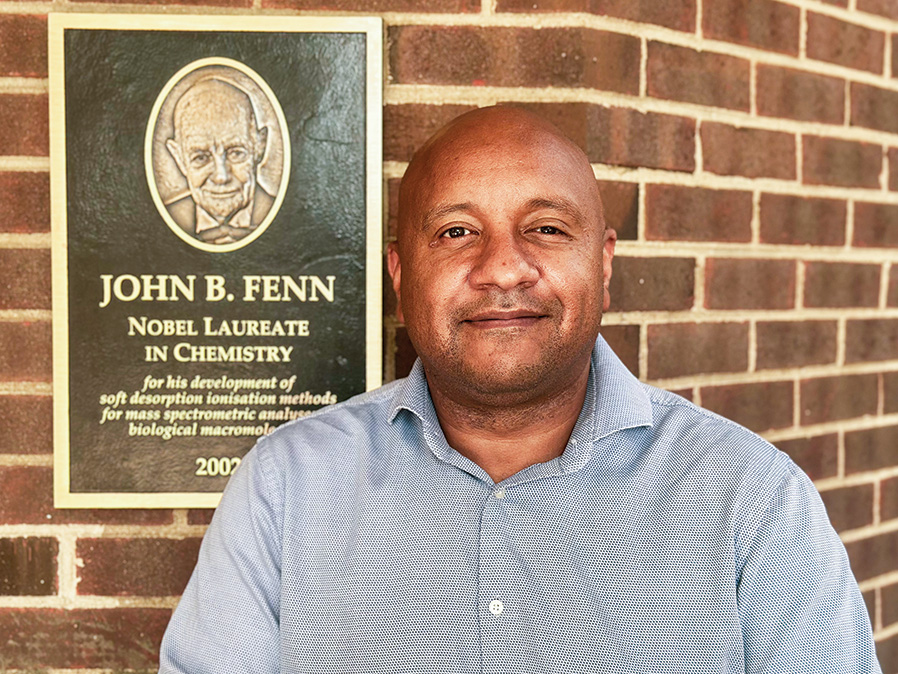No Regrets
 Fabio Gomes, Ph.D.
Fabio Gomes, Ph.D.Fabio Gomes, Ph.D., Department of Chemistry
When Fabio Gomes, Ph.D., an assistant professor in the Department of Chemistry, was finishing his postdoctoral research, he was presented with two options: accept lucrative offers from pharmaceutical companies — more than double the salary of a university position — or pursue a career in academia.
Gomes chose academia, a decision driven by curiosity and passion. “Leading my own research group, exploring my own ideas, and training the next generation of scientists are priceless,” he explained. “It was not a hard choice because I fell in love with academic research.”
Q: How did you discover your love of chemistry?
A: I grew up in São Paulo, Brazil, in a family with very limited resources. To be honest, I thought I was going to be a soccer player — becoming a chemist with a Ph.D. was not just unlikely, it was unimaginable. No one in my family had taken that path, and I did not know anyone who had. In kindergarten and elementary school, most of my teachers told my mom I was one of the smartest students out of a thousand. They encouraged me to take advanced classes and pursue higher education, but I did not think much of it at the time. I just enjoyed helping classmates solve math and physics problems — that was fun.
It was not until the end of my undergraduate studies, when I began working in an organic chemistry lab, that everything changed. That’s when I fell in love with chemistry. For the first time, I felt a deep sense of purpose — something I had never experienced before.
Q: It seems like mentorship was a large part of your educational journey. Can you tell us about a mentor who influenced your life and work?
A: I was fortunate to have two influential mentors during my postdoctoral training. First, I was trained in the lab of Catherine Fenselau, Ph.D., a pioneer in the field of biological mass spectrometry. Her mentorship sparked my fascination with mapping intact protein structures using mass spectrometry and applying this structural knowledge to answer fundamental biological questions.
Later, I joined the lab of John Yates, Ph.D., where I developed expertise in bioinformatics and biological techniques. His lab gave me the opportunity to expand on what I had learned with Dr. Fenselau, integrating computational and biological approaches. It was during this time that I fully realized my aspiration to pursue a career as an academic scientist.
Q: Can you tell us about mass spectrometry and how you use it in your research?
A: Mass spectrometry is a powerful analytical tool that allows us to study molecules with remarkable precision. What drew me to this technology is its unique ability to bridge basic science, drug discovery, and clinical application. It plays a central role in therapeutic development — from validating drug targets to monitoring treatment responses — and is increasingly used in clinical diagnostics. Its versatility makes it an essential platform for translating molecular insights into real-world therapies.
My research team uses mass spectrometry to characterize biomolecules and their binding partners, revealing insights into biological processes, disease mechanisms, and potential drug targets. One major focus of my research program is understanding drug resistance in breast cancer, the main reason many patients progress to metastatic disease and die. We are using mass spectrometry to uncover the molecular drivers of resistance, with the goal of developing strategies to overcome it. We are also investigating estrogen signaling, which plays a critical role in both male and female physiology, but remains poorly understood. By dissecting the actions of the estrogen hormone at the molecular level, my research group aims to help design more targeted therapies.
Ultimately, my overarching goal is to understand the molecular basis of fundamental cellular processes and apply this knowledge to help address challenges in medicine, thereby improving public health.